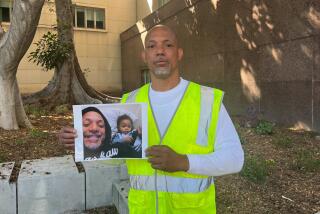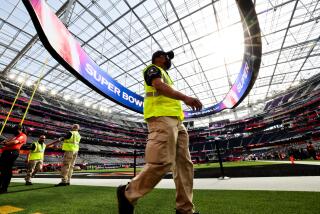Parents of UC Irvine grad who died at Electric Daisy Carnival sue LiveNation and others over his death

- Share via
The parents of a 24-year-old man who died from a drug overdose at the Electric Daisy Carnival filed a lawsuit Tuesday against the rave’s promoters, claiming the slow response to their son’s medical emergency led to his death.
Nicholas Austin Tom, a UC Irvine graduate who resided in San Francisco, died of intoxication of MDMA, or Ecstasy, at the rave on June 21, 2015, according to the Clark County coroner’s office. That year’s event was held at the Las Vegas Motor Speedway.
His parents, Terry and Gayline Tom, alleged that Insomniac Holdings and Live Nation Entertainment — both based in Beverly Hills — were negligent in running the festival by training the staff poorly and having inadequate medical resources for the tens of thousands of attendees.
During that year’s festival, known as EDC, more than 1,400 medical calls were requested and more than two dozen people were taken to the hospital, according to the lawsuit and news reports.
On the third day of the rave, amid sweltering Las Vegas heat, Tom ingested Ecstasy, a popular drug among festival-goers. About 1:30 a.m., he collapsed on the ground in a seizure.
According to the lawsuit, attendees tried to carry him through the audience and yelled for medical help, but the loud music and packed crowd delayed them.
It took about 30 minutes for Tom to be carried to the medical tent. All the while, he was unconscious and seizing, according to court papers.
Tom’s parents allege the medical tent was empty, and a ground crew that arrived had scant medical training. Their son was left on the floor for another half-hour, where he died, according to the lawsuit.
His parents stated in the suit that the “roaming medical teams” organizers touted were absent during Tom’s seizure, and the staff was either untrained or ill-equipped to handle a medical emergency.
Neither company could be reached for comment.
After Tom’s death, a spokeswoman for Insomniac expressed condolences to his family and said: “Participating in illicit drug behavior can have tragic consequences and we hold a strict zero tolerance policy for illegal activity while continually educating our fans on the dangers of drug use.”
Tom had completed his undergraduate degree in biological sciences in 2013 and became a medical assistant at UC San Francisco Medical Center. His parents said he was hoping to become a physician’s assistant.
At the time of his death, Tom was at least the fifth attendee of the Electric Daisy Carnival in Las Vegas to die from drugs or alcohol since the festival relocated from the Los Angeles Memorial Coliseum in 2011.
The festival moved after a Los Angeles Times investigation disclosed how a government stadium manager who oversaw security and emergency services was also being paid by the rave company, Los Angeles-based Insomniac.
Public health and law enforcement officials have long warned about the dangers of drugs at raves and music festivals, where some opt for Ecstasy and other illicit substances to fuel hours-long dance parties.
The lawsuit filed by Tom’s parents cites Trinka Porrata, a former Los Angeles police officer and drug expert, who estimated that 85% of ravegoers are high on MDMA or other drugs. MDMA is the shortened version of Ecstasy’s scientific name.
Characterized by the feelings of euphoria it produces in users, Ecstasy can cause body temperatures to spike to 108 degrees, leading to organ failure, seizures, coma and death.
Between 2006 and 2016, there have been at least 29 drug-related deaths nationwide among those who attended raves organized by L.A.-area companies.
On Saturday, during this year’s EDC festival at the Las Vegas Motor Speedway, a California man died, Clark County Coroner John Fudenberg told the Las Vegas Review-Journal. It’s unclear how Michael Morse, 34, died. Coroner’s officials told Morse’s wife that his body temperature was 109 degrees at the time of his death, the newspaper reported.
Twitter: @MattHjourno
UPDATES:
10:00 p.m.: This article was updated with minor editing.
This article was originally published at 4:15 a.m.
More to Read
Sign up for Essential California
The most important California stories and recommendations in your inbox every morning.
You may occasionally receive promotional content from the Los Angeles Times.














